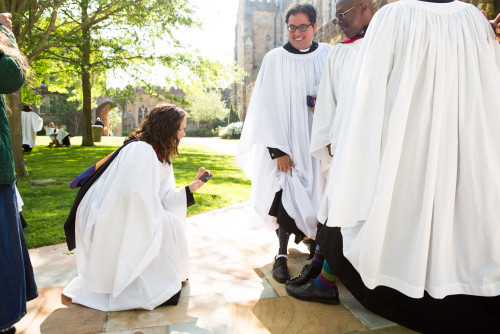We want students at the School of Theology to be focused on prayer, study, and service–not worrying about finances.

Thanks to the gifts of many generations, Sewanee has substantial resources to support students. We are glad to offer generous financial aid to supplement seminary students’ own resources and the financial support of the parishes and dioceses that send them.
Financial Aid Policy
Financial aid is meant to serve the Church’s mission by:
- opening the way to excellent theological education to those who otherwise could not afford it,
- to minimize the burden of additional educational debt carried into ministry,
- and to limit the drain on personal assets for all students.
Dimploma of Anglican Studies (D.A.S.)
As a Diploma of Anglican Studies student you'll receive full tuition and fees and an additional $10,000 regardless of need. This offer is extended to the first 5 students who are admitted and enroll. Additional students will fall under a need-based aid policy.
Master of Sacred Theology / Anglican Studies (S.t.m./a.s.)
As a Master of Arts student you'll receive full tuition and fees and an additional $10,000 regardless of need. This offer is extended to the first 5 students who are admitted and enroll. Additional students will fall under a need-based aid policy.
Where does that money go?
Financial aid will be deposited into your student account. The University will charge expenses such as tuition, fees, and any other charges you may choose to incur such as rent from University rental housing, a meal plan, University-administered health insurance, etc. to that account.
What is the cost of tuition and fees?
The anticipated tuition & fees for the 2025–2026 academic year will be $20,500.
What about housing?
The University has 124 rental housing units of varying sizes and amenities. If you choose to live in University rental housing, you’ll work with the Office of Rental Housing to find a unit that works best for you and your family. Rent will be charged monthly to your student account. Some students opt for private housing options, which will not be charged to your student account. Click here to learn more about housing.
What about meal plans?
The University also offers an optional meal plan for graduate students. Those who choose to opt into the meal plan will see those charges on their student accounts.
What if I receive more aid than the University charges?
Some students will make decisions about their housing and meal plans that will result in having more financial aid than the University charges. In this case, students are eligible to withdraw additional funding beyond anticipated charges into their personal bank accounts.
What about other support?
Funding a theological education is a responsibility shared between the student, the seminary, the Church, and outside partners. Students are expected to contact their parish and diocese and request financial support for their formation. Additionally, they will be required to apply for outside scholarships. Any funding awarded to students may be sent directly to the student or sent to the University; it will then be deposited into the student’s account.
All seminaries calculate financial aid differently. Make sure you ask these questions to anyone you’re discerning a theological education with. If you feel called to Sewanee and wish to become a member of this community of scholars and learners, let us look at any offers you may have received from other seminaries and help you compare funding against costs. We believe with confidence that if you can afford to attend any seminary, you can afford to attend Sewanee.
Forms
You'll find the application for financial aid here.
It is our belief that the Church needs to financially support those it raises up for ministry. Any amount, large or small, will be helpful in creating a positive financial reality for you and your family. Students preparing for ordination will be required to submit the following supplemental forms:
- 2025 - 2026 Congregational Support Form.
- 2025 - 2026 Diocesan Support Form.
- 2025 - 2026 Financial Aid Disclosure.
Please note, these forms are required for ordination track students in order to complete an application for financial aid, even if the parish or diocesan support is $0.
Other Funding Opportunities
While it may be possible for students to graduate from the School of Theology debt free, it is our expectation that you are actively seeking to supplement our aid with outside resources. It is the responsibility of all applicants for need-based financial aid to show evidence of submitting applications for scholarships from at least three outside sources in addition to diocese and parish. You’ll find a list of resources here as a place to begin your search. Additionally, it is recommended that you begin soliciting contributions from family, friends, other individuals, the sending parish, and the diocese.



